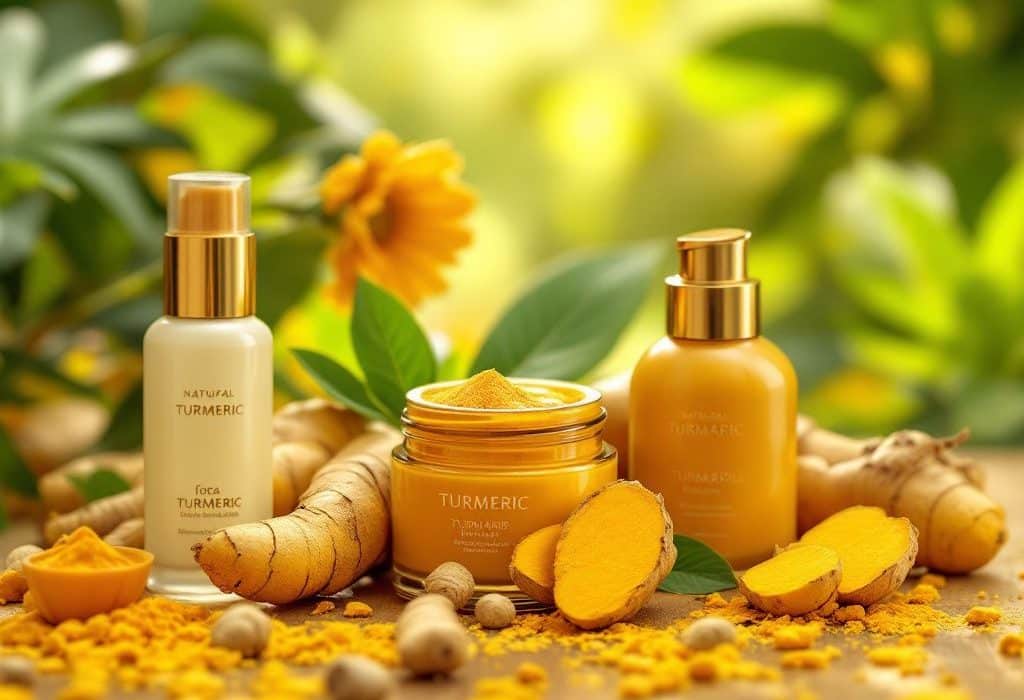Hey there, dream chasers of glowing skin! Ever stood in front of the mirror, wondering if there’s a secret to achieving that radiant glow we all see in glossy magazines? Well, ever heard of the “Golden Spice”? Yep, I’m talking about turmeric! Many think of it as just a spice for cooking, but let me tell you, this golden wonder is a game-changer in the realm of natural skincare.
Whether you’re battling blemishes or hoping to find that elusive glow, turmeric might just be what you’re looking for. And one of the easiest ways to incorporate this into your skincare routine? A turmeric face mask! Trust me on this one—it’s as simple as it is effective.
The Golden Glow—Why Turmeric?
Turmeric’s potential doesn’t just stop at spicing up your curry. It’s an ancient beauty secret, lest we forget. Dating back thousands of years, it’s been a go-to for natural skincare remedies, especially in Indian cultures. Seriously, turmeric face masks have been around longer than your favorite night cream has! The spice owes its golden hue to curcumin, which is loaded with anti-inflammatory and antioxidant properties.
What Can Turmeric Do For Your Skin?
Here’s the lowdown—turmeric can help with everything from softly fading scars to zapping away pesky acne. Sounds like magic, right? Well, its powerful antioxidants and anti-inflammatory components provide real benefits:
- Battles Blemishes: Turmeric’s natural properties make it a fierce fighter against acne. So if you’re seeing more breakouts than you’d like, this golden spice can be your trusty sidekick.
- Reduces Redness and Swelling: Think of turmeric as your skincare calming agent. Those rosy cheeks not from blush? This can soothe that irritation.
- Brightens Your Complexion: It’s not just about calming inflammation. Regular turmeric masks can unveil a glow like no other.
- Fades Scars and Blemishes: Those tiny pigmentary warriors in turmeric work subtly yet steadily to fade scars. So if you’ve got acne marks hanging around, give this a try.
Creating Your Turmeric Face Mask

Ready to get your hands on this? Making a turmeric face mask isn’t rocket science, folks. It’s pretty straightforward, honestly. Here’s a basic, but powerful recipe to get you started:
Ingredients You’ll Need:
- Turmeric Powder: Make sure it’s high-quality. You want organic if you can find it.
- Plain Yogurt: This adds a nice coolness to the mix and helps in creating a smooth skin feel.
- Honey: Nature’s gold, known for its moisturizing properties.
- A Few Drops of Lemon Juice: Not too much, especially if you have sensitive skin, as it can be a bit strong.
Simple Steps:
- Gather Ingredients: Easy peasy. Lay out your turmeric, yogurt, honey, and lemon juice.
- Mix It Up: In a small bowl, combine half a teaspoon of turmeric, a tablespoon of yogurt, a teaspoon of honey, and a few drops of lemon juice. Mix until smooth.
- Prep Your Face: Cleanse your skin using your usual routine to make sure there are no obstructions in the way of all those good ingredients. Pat dry gently.
- Apply Mask: Evenly spread the concoction over your face, avoiding eye and mouth area—trust me, it’s not delicious, no matter how much you love turmeric.
- 5. **Relax and Wait: Leave it on for about 10-15 minutes. Perfect excuse to kick back with a snack.
- 6. **Rinse Off: Use lukewarm water to wash it off, moving in gentle circular motions. Try not to scrub too hard; let the natural ingredients do their thing.
- 7. **Pat Your Skin Dry: Gently now. And enjoy how smooth it feels! Follow up with your favorite moisturizer.
A Few Notes on Using Turmeric Face Masks

Sure, it sounds like a miracle, but it’s not entirely without its quirks. It’s important to remember to do a patch test first if you’ve never used turmeric on your skin before. Better safe than sorry, right? Sometimes, depending on your skin type, turmeric can stain—but don’t worry, it comes off.
A Touch of Science
Did you know that some dermatological studies suggest turmeric has antibacterial properties that might assist in dealing with acne bacteria? It’s science aligning with ancient wisdom, really marvelous how it falls into place.

Customizing Your Mask
Think of the turmeric face mask as your base recipe; feel free to play around with it to see what works best for your skin. Add in some oats for extra exfoliation or swap out yogurt for aloe vera gel if you’re dairy-free.
When Should You Use It?
The great thing about natural skincare is that it doesn’t come with a rulebook. Generally, sticking to once or twice a week is ideal to enjoy those glowing benefits without overloading the skin.
Common Mistakes and What to Avoid
- Not Testing First: Always test on a small patch of skin.
- Using Too Much Turmeric: Stick to the recommended amount to avoid staining and irritation.
- Applying on Dirty Face: Always work with a clean canvas, friends.
- Over-Masking: Skin can become sensitive if masked too often. Maintain that balance.
In the wide world ffective remedicare, turmeric reigns high as one of the most accessible, effective remedies you can find. So how about it? Why not step into your kitchen and give this turmeric face mask a try? Your skin just might thank you with a rewarding, radiant glow that gives confidence a whole new meaning. And wasn’t that exactly what you stepped up for?
Feel free to share your results—whether it’s astonishing or not so much, because in this skincare journey, we’re all learning and glowing together!
Frequently Asked Questions
What are the benefits of using natural skincare products?
Natural skincare products offer several benefits, including being gentler on the skin, reducing the risk of irritation and dryness, and providing nourishment with nutrient-rich ingredients. They are free from harsh chemicals, artificial colors, and fragrances, making them suitable for sensitive skin. Additionally, natural skincare products can help prevent premature aging, protect against free radical damage, and are more environmentally friendly[1][3][5).
What natural ingredients are commonly used in natural skincare products?
Common natural ingredients used in skincare include coconut oil, shea butter, aloe vera, green tea, chamomile, argan oil, and honey. These ingredients are rich in vitamins, antioxidants, and essential fatty acids that help moisturize, soothe, and protect the skin. For example, aloe vera is moisturizing and soothing, while green tea helps reduce oxidative stress and cellular aging[1][3][5).
Are natural skincare products suitable for all skin types?
Yes, natural skincare products are suitable for various skin types, including sensitive skin. They are formulated to work in harmony with the skin’s natural mechanisms, making them a good choice for those who experience irritation from synthetic ingredients. Natural products come in a range of options, such as creams, serums, and masks, allowing users to find products tailored to their specific skin concerns[1][3][5).
How do natural skincare products impact the environment?
Natural skincare products have a positive impact on the environment because they are made from natural ingredients and do not contain harsh chemicals, pesticides, or fertilizers. Unlike synthetic skincare products, natural products do not leave chemical residues in the environment or pollute soil and water when washed down drains. This makes them a more eco-friendly choice[1][3][5).
References- Learn Canyon. (2023). The Benefits Of Using Natural Products.
- RFS Adermatology. (2023). The Pros And Cons Of Using Natural Skin Care Products.
- Beau Domaine. (2023). Why Use Natural Skin Care?.


